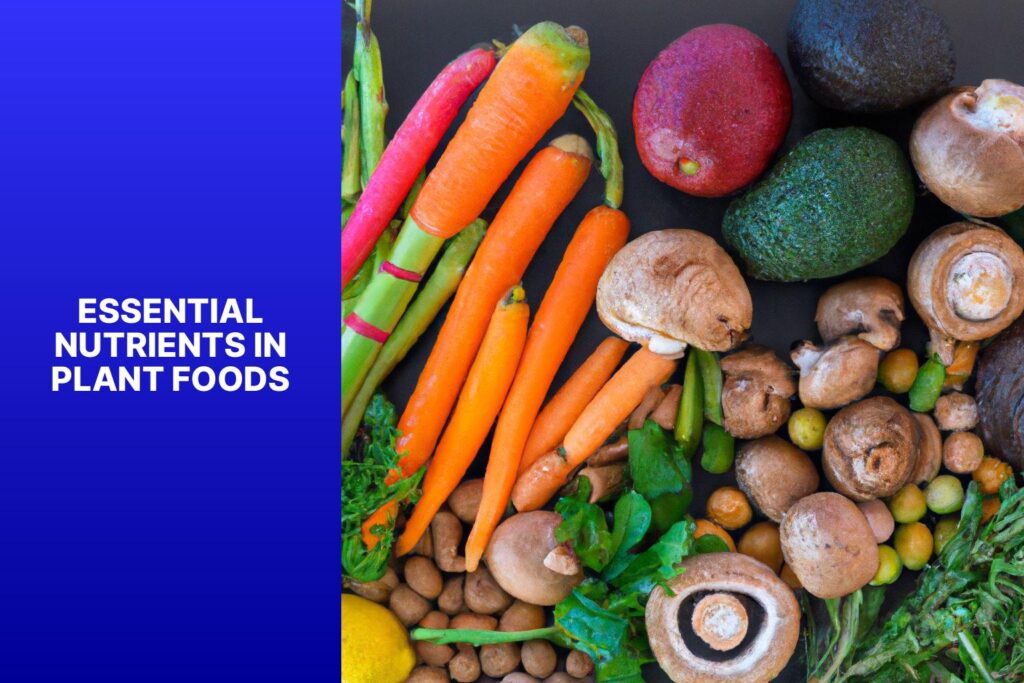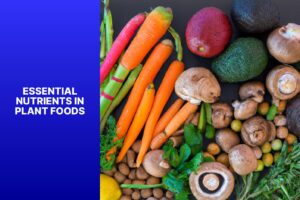The world of plant foods is a treasure chest of essential nutrients which can nurture and improve our well-being. From vivid fruits to leafy greens, these nutrient dynamos provide numerous health benefits. We’ll investigate the introduction of essential nutrients in plant foods, exploring their importance and the role they play in sustaining our overall health.
Plant-based diets have earned substantial acclaim in recent years due to their many health benefits. These diets center around eating foods mainly from plants, like fruits, veggies, whole grains, legumes, nuts, and seeds. By centering our diet around plant-based foods full of essential nutrients, we can gain the advantages of improved health and liveliness.
When it comes to essential nutrients, plant foods have an amazing selection. They are overflowing with vitamins, minerals, fiber, antioxidants, and phytochemicals which support different bodily functions. For instance, vitamin C found in citrus fruits helps with collagen synthesis and boosts immune system performance. Also, dark leafy greens such as spinach give iron for healthy blood cells and folate for cell growth and repair.
To take advantage of essential nutrients in plant foods, it’s necessary to include a diversified selection into our daily meals. Eating a colorful variety of fruits and vegetables ensures a wide array of vitamins and minerals needed for optimum health. Additionally, focusing on whole grains rather than refined ones guarantees higher fiber content and more prolonged energy levels during the day.
Plus, cooking methods can also affect nutrient availability. Choosing to steam or roast instead of boiling reduces nutrient loss while preparing. It’s best to avert extreme processing or overcooking as this can decrease the nutritional value of plant-based foods.
What Are Essential Nutrients?
Essential nutrients are really important. Our bodies can’t make them, so we need to get them from food. They help us stay healthy and prevent us from getting sick.
Plants are a great source of essential nutrients. They give us vitamins, minerals, antioxidants, and phytochemicals which our body needs. They help with metabolism, our immune system, and cell growth.
Did you know that plant-based foods also contain fiber? This helps digestion and stops us getting constipated. It also reduces cholesterol and keeps our blood sugar balanced.
Leafy greens like spinach and kale are super rich in iron. Iron deficiency is a common problem, and these greens can help.
Importance of Essential Nutrients in Plant Foods
Plant foods play a crucial role in providing essential nutrients that are necessary for our overall health and well-being. These nutrients include vitamins, minerals, antioxidants, and fiber, which are essential for the proper functioning of our body. By incorporating plant foods into our diet, we can ensure that we are getting a wide range of these essential nutrients.
Additionally, plant foods are often rich in phytochemicals, which have been shown to have numerous health benefits, including reducing the risk of chronic diseases like heart disease and certain types of cancer. When we consume plant foods regularly, we are giving our bodies the necessary tools to maintain optimal health and vitality.
Furthermore, plant foods are not only nutrient-dense but also low in calorie content, making them a great choice for those looking to maintain a healthy weight. The fiber present in plant foods helps to promote a feeling of fullness and can aid in digestive health. Additionally, the antioxidants found in plant foods help to protect our cells from damage caused by free radicals, which can contribute to aging and various diseases.
An interesting example of the importance of essential nutrients in plant foods is the Blue Zones, regions in the world where people live significantly longer and healthier lives compared to the global average. One common factor among these Blue Zones is the consumption of plant-based diets, which are rich in essential nutrients. These communities rely heavily on plant foods such as fruits, vegetables, whole grains, legumes, and nuts, which provide them with a wide array of nutrients and contribute to their longevity and well-being.
By recognizing the importance of essential nutrients in plant foods and incorporating them into our daily diet, we can take a proactive step towards improving our health and longevity. It is essential to prioritize a varied and balanced diet that includes a wide range of plant foods to ensure that we are obtaining all the essential nutrients our bodies need for optimal functioning.
Who needs a multivitamin when you can get all your essential nutrients from plants and have your daily serving of greens and guilt at the same time?
Vitamins
Vitamin A: An antioxidant necessary for healthy vision, skin, and immunity. Found in carrots, spinach, and sweet potatoes.
Vitamin C: Boosts immunity and creates collagen. Oranges, strawberries, and bell peppers are great sources.
Vitamin E: Antioxidant benefits and supports skin health. Nuts, seeds, and greens provide it.
B vitamins (B6 and B12), vitamin D, and vitamin K too. For energy, bones, and clotting.
Fill your diet with plant foods! Unlock the potential of your health. Don’t miss out on vitamins’ benefits. Nature provides variety – so nourish your body and thrive!
Minerals
A table shows important minerals found in plant foods:
| Mineral | Function | Sources |
|---|---|---|
| Iron | Helps photosynthesis and respiration | Spinach, lentils, fortified cereals |
| Calcium | Strengthens cell walls | Broccoli, almonds, tofu |
| Magnesium | Helps produce chlorophyll | Pumpkin seeds, bananas, beans |
| Potassium | Regulates water | Sweet potatoes, avocados, tomatoes |
| Zinc | Assists enzyme activity | Chickpeas, cashews, mushrooms |
| Phosphorus | Transfers energy | Quinoa, lentils, sunflower seeds |
Plants contain trace elements too, like selenium and copper. These are vital, though needed in small amounts.
To get minerals from plants:
- Eat a variety. Different plants offer many minerals necessary for health.
- Choose organic. Soil quality impacts mineral content in plants.
- Cook properly. Minerals become more available when cooked or soaked. For example, iron absorption increases when legumes are soaked.
- Cut down on processing. Highly processed plant-based products may have reduced minerals due to refining or fortification.
By following these tips and eating a wide range of plants, you can get enough essential minerals for optimal plant growth and health.
Fiber
Fiber aids digestion by adding bulk to stool. This helps with regular bowel movements and prevents constipation. It also keeps blood sugar levels steady, which is good for people with diabetes. Plus, heart health is improved since it reduces LDL cholesterol and lowers the risk of cardiovascular diseases. Lastly, it supports weight management by lessening hunger and avoiding overeating.
What’s more, fiber-filled foods are usually low in calories and high in nutrients. Examples are whole grains, fruits, veggies, legumes, and nuts.
Something special about fiber is that it doesn’t get broken down by the body’s digestive system enzymes. It passes through relatively intact, helping digestion and fending off diseases like diverticulitis.
This idea of dietary fiber came from Sir Albert Howard. He noticed that people who ate unrefined grains had fewer digestive issues than those who ate refined foods. This got researchers all over the world interested in learning more about the importance of fiber.
Remember to add fiber-rich foods such as whole grains, fruits, veggies, legumes,
Sources of Essential Nutrients in Plant Foods
In plant-based foods, various sources provide essential nutrients that are crucial for maintaining good health. These nutrients can be found in a wide range of plant-based sources, such as fruits, vegetables, grains, legumes, nuts, and seeds. Each of these plant foods offers a unique combination of vitamins, minerals, and other beneficial compounds that contribute to overall well-being.
Below is a comprehensive table showcasing the different plant foods and the essential nutrients they provide:
| Plant Food | Essential Nutrients |
|---|---|
| Fruits | Vitamin C, Dietary Fiber |
| Vegetables | Vitamin A, Vitamin K, Folate |
| Grains | Fiber, B Vitamins, Iron |
| Legumes | Protein, Fiber, Folate |
| Nuts and Seeds | Healthy Fats, Vitamin E, Magnesium |
It’s worth noting that each individual plant food can contain multiple essential nutrients, and consuming a varied and balanced plant-based diet ensures the intake of a wide range of these nutrients. By incorporating a diverse mix of plant foods into one’s diet, individuals can obtain the necessary vitamins, minerals, and other valuable compounds required for optimal health.
Now let’s look at a fascinating aspect related to these essential nutrients in plant foods. Throughout history, various cultures have recognized and utilized the nutritional benefits of plant foods. Indigenous communities, for instance, have long relied on their local plant resources to fulfill their nutritional needs. Ancient civilizations developed agricultural practices to grow specific plants that provided essential nutrients and sustained their populations. This historical context highlights the importance and significance of incorporating plant-based foods into our diet for obtaining essential nutrients.
Prepare to have your mind blown as we take a juicy bite into the world of fruits: where healthy meets refreshing, and antioxidants meet the sweet satisfaction of wiping out free radicals.
Fruits
Fruits come in all shapes and sizes! We usually think of apples, bananas, oranges, and strawberries, but there are more out there. Check out the table for nutrients in different types of fruits!
| Fruit | Nutrients |
|---|---|
| Apples | Fiber (pectin), vitamin C, potassium |
| Bananas | Vitamin B6, vitamin C, potassium |
| Oranges | Vitamin C |
| Strawberries | Vitamin C, manganese |
Fruits can give us essential nutrients. Fiber helps digestion. Vitamins help our immune system. Potassium helps maintain blood pressure.
Here’s how to get the most out of these fruits:
- Eat whole fruits instead of juice.
- Eat a variety of colors for different antioxidants and phytochemicals.
- Have citrus fruits like oranges during cold seasons for extra vitamin C.
By adding a variety of fruits to our meals, we can have a balanced and nutrient-rich diet. Enjoy nature’s sweet offerings and nourish our bodies!
Vegetables
Veggies are packed with key nutrients! Vitamin C supports immunity, Vitamin K helps blood clot, Folate aids in cell growth and development, and Potassium regulates fluid balance. Plus, cruciferous veggies are linked to cancer prevention, while dark leafy greens are great sources of iron.
A study from the NHANES found that people who eat more veggies have a lower risk of chronic diseases like heart disease and hypertension. Eating a variety of veggies is a smart way to stay healthy!
Grains
Grains are nutrient-filled and contribute to a healthy diet. Here’s a look at the key nutrients in different grains:
| Grain Type | Protein (g) | Fiber (g) | Iron (mg) | Magnesium (mg) |
|---|---|---|---|---|
| Rice | 2 | 0.4 | 0.6 | 10 |
| Oats | 6 | 4 | 1.7 | 56 |
| Quinoa | 8 | 5 | 2.8 | 118 |
Let’s check out more facts about grains! Grains come in several forms, like whole, refined, and enriched. Whole grains include the bran, germ, and endosperm, which makes them more nutritious.
To make the most out of grains, keep these tips in mind:
- Pick whole-grain varieties: Whole grains have more fiber and nutrients than refined grains. Try incorporating whole-wheat bread or brown rice into meals.
- Vary your grain choices: Experiment with unusual grains like quinoa or buckwheat to get their unique nutritional value.
- Combine grains with other nutrient-rich foods: Serve grains with veggies, legumes, or lean proteins for a nutritional boost.
These suggestions provide extra vitamins, minerals, and fiber. Plus, they help you create a balanced meal plan for good health.
Legumes
Take a look at this handy table with the important nutrients found in different types of legumes! It’ll help you make the best choices for your diet:
| Type of Legume | Protein (per 100g) | Fiber (per 100g) | Iron (per 100g) | Magnesium (per 100g) |
|---|---|---|---|---|
| Chickpeas | 19 g | 17 g | 6 mg | 77 mg |
| Lentils | 9 g | 8 g | 3 mg | 36 mg |
| Black Beans | 21 g | 16 g | 2 mg | 60 mg |
| Kidney Beans | 24 g | 16 g | 7 mg | 55 mg |
Did you know that legumes not only offer great plant-based protein but also complex carbs? These take longer to digest and give you energy all day long!
These powerhouse plant foods are both good for you and the planet. From chickpeas in salads to lentils in soups to kidney beans in chili, the possibilities are endless.
It’s time to join the legume revolution! Not only are they tasty, they also bring lots of health benefits. Start exploring their culinary potential and nourish yourself with the goodness of legumes.
Recommended Daily Intake of Essential Nutrients
The optimal daily amount of necessary nutrients varies based on one’s age, sex, and overall health. To ensure a well-balanced diet, it is important to meet the recommended daily intake of essential nutrients. Below is a table presenting the recommended daily intake for different nutrients:
| Nutrient | Daily Intake |
|---|---|
| Vitamin A | 700-900 mcg |
| Vitamin C | 75-90 mg |
| Vitamin D | 15-20 mcg |
| Calcium | 1000-1300 mg |
| Iron | 8-18 mg |
| Zinc | 8-11 mg |
It is crucial to note that these recommended amounts may vary based on individual requirements. Adequate intake of essential nutrients promotes overall health, boosts immunity, and prevents various deficiencies. By consuming a diverse range of plant-based foods, one can easily meet these recommended daily intakes.
Interestingly, the concept of recommended daily intake of essential nutrients dates back to the early 20th century when scientists began studying the relationship between nutrition and health. Through extensive research and analysis, experts determined the specific nutrient thresholds necessary for optimal functioning of the human body. This knowledge is continually updated and refined as new discoveries are made in the field of nutrition science.
Stick to these nutritional guidelines, or don’t, because kale can’t make decisions for you.
Nutritional Guidelines
Nutritional guidelines help us understand our essential nutrient intake. The below table details specific nutrients:
| Nutrient | Recommended Daily Intake |
|---|---|
| Protein | 46 grams |
| Carbohydrates | At least 130 grams |
| Dietary Fiber | 25 grams (women), 38 grams (men) |
| Fat | 20-35% of daily calories |
| Sodium | Less than 2,300 milligrams |
| Potassium | At least 4,700 milligrams |
| Calcium | Approximately 1,000 milligrams |
| Iron | 8-18 milligrams |
Besides these nutrients, other vitamins and minerals are needed for optimal health. However, these guidelines may change with age, gender, and physical activity. Therefore, consult a healthcare professional for personalized nutrition advice. The World Health Organization (WHO) reports that millions of people suffer from malnutrition. It is vital to meet nutritional needs to maintain our health.
Different Dietary Needs
Individuals have different dietary needs based on various factors, such as age, sex, activity level, and health conditions. To understand these requirements, let’s explore them in a creative way.
Take a look at the following table:
| Nutrient | Adults (19-50 years) | Children (4-8 years) |
|---|---|---|
| Calories | 2,000 – 2,500 | 1,200 – 2,200 |
| Protein | 46 – 56 grams | 19 – 34 grams |
| Carbohydrates | 225 – 325 grams | 130 grams |
| Fat | 44 – 78 grams | 25 – 35 grams |
| Fiber | 25 – 38 grams | 25 – 31 grams |
| Vitamins & Minerals | ||
| – Vitamin A | 700 – 900 micrograms | 300 – 600 micrograms |
| – Vitamin C | 75 – 90 milligrams | 65 – 85 milligrams |
This table shows us the different nutritional needs between adults and children. Adults need more calories to meet their energy expenditure, while children require fewer calories but still need specific nutrients for growth and development.
Focusing on vitamins and minerals is important for both groups. For instance, vitamin A helps with vision and immunity. Adults should consume higher amounts of vitamin A than children, due to their higher body mass and metabolic processes. Vitamin C assists in collagen formation and acts as an antioxidant for both adults and children – albeit with slightly higher amounts for adults.
Consider Sarah’s story – a young woman who understood her own unique dietary needs when she began training for a marathon. With the help of a dietitian, she adjusted her nutrient intake to support her training and improve her performance. This personalized approach emphasizes the significance of understanding our own individual needs.
By comprehending the various dietary needs, we can make educated decisions about our nutrition to stay healthy. So, regardless of age, sex, activity level, or health conditions, customizing our diets can help us thrive as individuals with different nutritional needs.
Benefits of Consuming Essential Nutrients from Plant Foods
Plants are a great source of essential nutrients that can benefit overall health. They are packed with vitamins, minerals, and antioxidants that are essential for bodily functions. These nutrients can help with immunity, digestion, energy levels, and reduce the risk of certain diseases.
- Vitamins: Plants contain A, C, E, and K vitamins which act as antioxidants, counteracting inflammation and oxidative stress.
- Minerals: Leafy greens, legumes, and other plant-based foods provide iron, calcium, potassium, and magnesium. These minerals are important for strong bones and teeth, blood pressure regulation, and nerve function.
- Antioxidants: Fruits and vegetables have high levels of flavonoids and carotenoids. These reduce the risk of chronic conditions like heart disease and cancer.
- Fiber: Plant foods are a great source of dietary fiber. Fiber helps digestion and bowel regularity, controls blood sugar levels, and aids weight management.
Plant-based diets are also associated with lower cholesterol and improved cardiovascular health. They are low in calories, helping with weight loss or maintenance. By incorporating these foods into your meals, you get all the necessary nutrients for optimal health. Make the switch to plant-based now and enjoy better health in the future!
Potential Deficiencies and How to Prevent Them
Addressing any potential deficiencies and finding ways to prevent them is key. We’ll investigate key nutrients that may be missing from plant-based diets and strategies for avoiding these deficiencies.
Let’s start with this table of potential nutrient deficiencies and preventive measures:
| Nutrient | Deficiency Risk | Prevention |
|---|---|---|
| Iron | Anemia | Eat iron-rich foods like spinach, lentils, and tofu. Combine with vitamin C sources for better absorption. |
| Calcium | Osteoporosis | Have broccoli, kale, and sesame seeds. Or use fortified plant milk. |
| Vitamin B12 | Fatigue, nerve damage | Take B12 supplements or fortified products like nutritional yeast or plant milk. Monitor levels with regular blood tests. |
| Omega-3 fatty acids | Impaired brain function | Include flaxseeds, chia seeds, walnuts, or algae-based supplements in meals. |
These are just some of the essential potential deficiencies. Each person’s dietary needs may be different. Talk to a healthcare professional or registered dietitian for tailored recommendations.
Take Jill’s example. She followed a vegan diet with whole grains, legumes, fruits, and vegetables. But she had a vitamin B12 deficiency and persistent fatigue and numbness. With the help of a healthcare provider, Jill added B12-fortified foods. She saw big improvements in energy levels and overall well-being.
Be conscious of potential deficiencies and take measures to prevent them. This will help your plant-based diet stay optimal for your health and vitality.
Conclusion
Plant foods are full of essential nutrients that are essential for our health. Including a range of fruits, veggies, grains and legumes in our diet can give us important vitamins, minerals and antioxidants. These nutrients help lots of body functions, such as boosting immunity, aiding digestion, and reducing the risk of chronic illnesses.
Plant-based proteins found in foods like beans, lentils, tofu and tempeh can be great alternatives to animal protein sources. They not only provide essential amino acids but also have many health benefits. Plant proteins are generally lower in saturated fats and cholesterol, but high in fiber and antioxidants.
Adding nuts and seeds to our daily meals can supply us with healthy fats, protein, vitamins (like vitamin E) and minerals (like magnesium). These small powerhouses reduce inflammation in the body and help brain function.
A diversity of colorful fruits and vegetables makes sure that we get a wide array of phytonutrients. These natural compounds give plants their bright colors and offer many health benefits. For example, lycopene in tomatoes is linked to lower risks of certain cancers, while anthocyanins in berries may improve heart health.
To maximize nutrient absorption from plant foods, try these tips:
- Pair iron-rich plant foods with vitamin C sources to increase iron absorption. For instance, pair citrus fruits with leafy greens or lentils.
- Soak or sprout certain grains and legumes before cooking to reduce antinutrients like phytic acid that block mineral absorption. Soak beans overnight or sprout quinoa to improve digestion and maximize nutrient availability.
- Include fermented plant foods like sauerkraut or kimchi in our meals to get probiotics that support gut health. These foods contain helpful bacteria that aid digestion and promote nutrient absorption.
By following these tips, we can make the most of essential nutrients in plant foods. Remember, a balanced and varied plant-based diet provides us with all the nourishment for a healthy lifestyle.
Frequently Asked Questions
1. What are essential nutrients in plant foods?
Essential nutrients in plant foods are vitamins, minerals, and other compounds that are necessary for the proper functioning and growth of our bodies. These nutrients cannot be produced by the body and must be obtained through the consumption of plant-based foods.
2. Which plant foods are rich in essential nutrients?
Many plant foods are rich in essential nutrients. Some examples include fruits, vegetables, whole grains, legumes, nuts, and seeds. These foods are packed with vitamins, minerals, and antioxidants that are essential for maintaining good health.
3. What are the benefits of consuming essential nutrients in plant foods?
Consuming essential nutrients in plant foods has numerous health benefits. These nutrients support a strong immune system, help maintain healthy digestion, contribute to optimal brain function, promote healthy skin, hair, and nails, and may reduce the risk of chronic diseases such as heart disease and certain cancers.
4. How can I ensure I am getting enough essential nutrients from plant foods?
To ensure you are getting enough essential nutrients from plant foods, aim to include a variety of fruits, vegetables, whole grains, legumes, nuts, and seeds in your diet. Eating a colorful and diverse range of plant-based foods will help you obtain a wide spectrum of essential nutrients.
5. Can I meet all my nutritional needs solely from plant foods?
Yes, it is possible to meet all your nutritional needs solely from plant foods. However, it is important to pay attention to the variety and balance of the foods you consume to ensure you are obtaining all the essential nutrients your body requires. Consulting a registered dietitian can also help you plan a well-rounded plant-based diet.
6. Are there any plant foods that are considered “superfoods” for their nutrient content?
Yes, certain plant foods are often labeled as “superfoods” due to their high nutrient content. Examples of these nutrient-dense foods include kale, spinach, berries, avocados, quinoa, and chia seeds. While these foods offer significant health benefits, it is important to remember that a varied diet is key to obtaining all essential nutrients.



